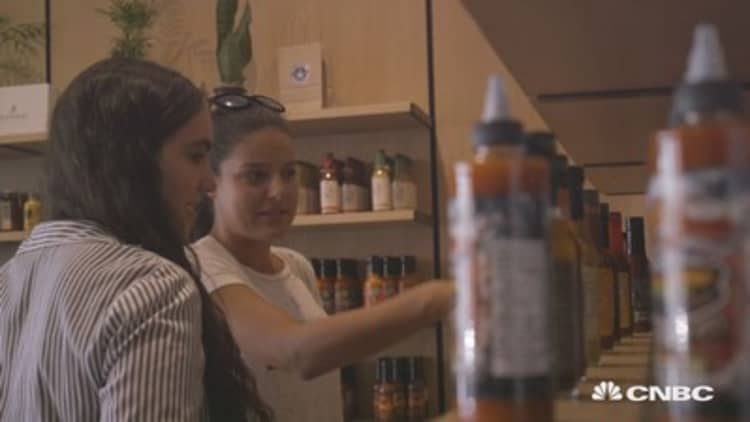
With hot sauce megabrands like Sriracha and Frank's RedHot in most restaurants, and hundreds of smaller brands available online, starting a business in what can be called an oversaturated market seems difficult at best.
But a young duo of self-described hot sauce sommeliers have carved out a space for themselves. It's called Heatonist, a small hot sauce shop complete with a tasting room located in the Williamsburg section of Brooklyn, New York.
The business's secret sauce? Offering customers a select group of all-natural hot sauces made by small, independent makers—and a chance to taste them.
"So much of it is really about discovery. We want people to come in and constantly be encountering something new that will get their creative juices flowing in the kitchen," said Noah Chaimberg, co-owner of the business with Tyler McKusick.
The small store is modern and hip—its walls decorated only with shelves upon shelves of quirky, spicy sauces ranging from ghost pepper and blueberry to chili pepper-infused honey.
Heatonist—which started out about 18 months ago as a hot sauce cart—prides itself on selling mom-and-pop created sauces exclusively. All of the sauces are made without artificial ingredients and are from "small-batch" makers.
By 2019, hot sauce revenues are expected to reach $1.3 billion, compared to $1.1 billion in 2014, according to market research firm IBISWorld. And a new study showing the health benefits of eating spicy foods has likely contributed to the boost.
But a friendly market doesn't mean a business will be successful.
"These days you can't compete against somebody like Amazon if you're only going to offer the same thing," Chaimberg said.
The sauces at Heatonist come from as far away as Japan, Sweden and New Zealand, and as local as a few neighborhoods in different parts of New York City.
"What we're trying to do is get rid of the real dirty work where you have to find the really good ones," McKusick said.
Since opening shop, the pair have tasted more than 2,000 different sauces, he said. They can distinguish ingredients and tell how fresh a sauce's peppers are.
One customer from Serbia looked up the company online after a friend from there told her about it. "I'm bringing the hottest one back home," Nadja Marsicevic said, holding up her bag.
Most of the bottles range from $8 to $12.
"We see a movement towards people wanting to know where their food comes from, who's making it," Chaimberg said, adding "now that's trickled down to condiments and packaged foods."
Taku Kondo, a habanero farmer and owner of Mellow Habanero, visited Heatonist in early August. The habanero farmer—whose hot sauce is sold at Heatonist—started his business after being given a single pepper plant from his friend.
It's these kind of stories Heatonist likes to share.
And the owners are committed to this model. When a hot sauce brand gets "too big"—say it's picked up by Whole Foods or another major retailer—the co-owners will likely stop selling it and open up their shelves to a new small business.
There's no shortage of hot sauce options at the store, even for milder tongues. Emphasizing flavor over heat is the biggest trend in hot sauce right now, the sommeliers said.
"We've seen over the last few years a big emergence of fruit in sauces," Chaimberg said.
A few customers tried one pineapple-infused hot sauce while McKusick described its ingredients. "This one would be great for cocktail making," said Chellise Michael, resident of Bushwick, New York.
"The fruit is really bright, which is surprising," Jessica Lambert, a mixologist at Sable Kitchen & Bar, in Chicago, said trying the same one.
Tourists from London, Amsterdam, San Diego and other cities have asked Heatonist to open up a location in their area.
"We definitely have our ears open," Chaimberg said.




